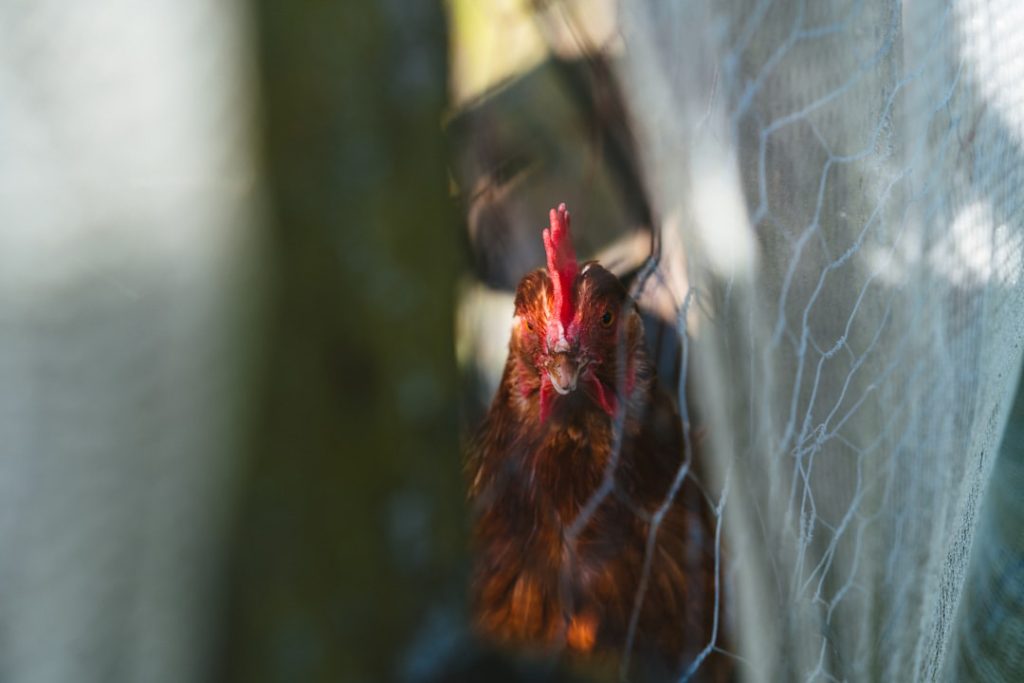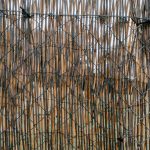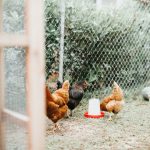When selecting a fence for a chicken coop, several factors should be considered. The primary function of the fence is to provide a secure barrier between chickens and potential predators. Wire mesh fencing is a popular choice due to its visibility and ventilation properties while offering protection.
The fence height should be sufficient to prevent predators from jumping over. Material selection is crucial for longevity and effectiveness. While wood fences may be aesthetically pleasing, they can be susceptible to rot and decay.
Metal fences, such as chain link or welded wire, are often more durable and secure. Vinyl-coated wire mesh offers additional protection against rust and corrosion. The size of the coop and the number of chickens are important considerations when choosing a fence.
Larger coops with more chickens may require taller and sturdier fencing for adequate protection. Climate should also be taken into account, as certain materials may be better suited for specific weather conditions. For instance, in rainy or humid climates, a vinyl-coated wire mesh fence might be preferable due to its resistance to rust and corrosion.
Ultimately, the ideal fence for a chicken coop depends on specific needs and preferences, but durability and security should be prioritized in the decision-making process.
Table of Contents
- 1 Securing the Bottom of the Fence
- 2 Regular Inspections and Maintenance
- 3 Using Chicken Wire or Hardware Cloth
- 4 Creating a Barrier to Prevent Jumping
- 5 Providing Adequate Space and Entertainment
- 6 Training Your Chickens
- 7 FAQs
- 7.1 What are the benefits of keeping chickens inside a fence?
- 7.2 What type of fence is best for keeping chickens inside?
- 7.3 How high should the fence be to keep chickens inside?
- 7.4 What are some additional measures to keep chickens inside the fence?
- 7.5 Are there any plants or landscaping that can help keep chickens inside the fence?
- 7.6 What are some common challenges in keeping chickens inside a fence?
Key Takeaways
- Choose a fence type that is appropriate for your specific needs and the size of your chicken coop area.
- Secure the bottom of the fence to prevent predators from digging underneath and gaining access to your chickens.
- Regularly inspect and maintain the fence to ensure it remains in good condition and continues to provide adequate protection.
- Consider using chicken wire or hardware cloth to reinforce the fence and prevent smaller predators from entering the coop area.
- Create a barrier to prevent chickens from jumping over the fence and escaping their designated area.
- Provide adequate space and entertainment within the coop area to keep chickens happy and prevent them from trying to escape.
- Train your chickens to recognize the boundaries of their designated area and to return to the coop at night for safety.
Securing the Bottom of the Fence
Underground Barrier
One effective way to do this is by burying the bottom of the fence underground to prevent predators from digging underneath it. This can be done by digging a trench around the perimeter of the coop and burying the bottom of the fence at least 12 inches deep.
Additional Deterrents
Additionally, you can use hardware cloth or chicken wire to create an apron around the outside of the coop, which will further deter predators from digging underneath the fence. Another option for securing the bottom of the fence is to use concrete or paving stones to create a barrier around the perimeter of the coop. This will prevent predators from being able to dig underneath the fence and access your chickens.
Regular Inspection
It’s important to regularly inspect the perimeter of the coop to ensure that there are no gaps or weak spots where predators could potentially gain access. By taking these measures to secure the bottom of the fence, you can help ensure the safety and security of your chickens.
Regular Inspections and Maintenance
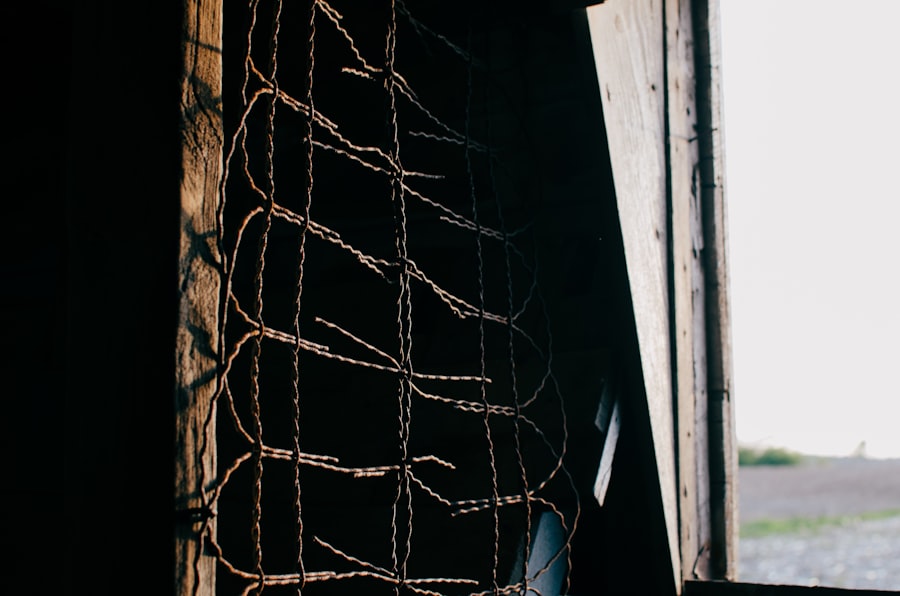
Regular inspections and maintenance are essential for keeping your chicken coop secure and in good condition. It’s important to regularly inspect the fence for any signs of damage or wear, such as rust, corrosion, or loose wires. Additionally, you’ll want to check for any gaps or weak spots in the fence where predators could potentially gain access.
If you notice any issues with the fence, it’s important to address them promptly to prevent any potential security breaches. In addition to regular inspections, it’s important to perform routine maintenance on the fence to keep it in good condition. This may include cleaning the fence to remove any debris or buildup, as well as applying a protective coating or sealant to prevent rust and corrosion.
By staying on top of regular inspections and maintenance, you can help ensure that your chicken coop remains secure and your chickens stay safe from potential predators. Regular inspections and maintenance are essential for keeping your chicken coop secure and in good condition. It’s important to regularly inspect the fence for any signs of damage or wear, such as rust, corrosion, or loose wires.
Additionally, you’ll want to check for any gaps or weak spots in the fence where predators could potentially gain access. If you notice any issues with the fence, it’s important to address them promptly to prevent any potential security breaches. In addition to regular inspections, it’s important to perform routine maintenance on the fence to keep it in good condition.
This may include cleaning the fence to remove any debris or buildup, as well as applying a protective coating or sealant to prevent rust and corrosion. By staying on top of regular inspections and maintenance, you can help ensure that your chicken coop remains secure and your chickens stay safe from potential predators.
Using Chicken Wire or Hardware Cloth
Using chicken wire or hardware cloth is an effective way to provide added protection for your chicken coop. These materials can be used to reinforce existing fencing or create a secondary barrier around the perimeter of the coop. Chicken wire is a lightweight and flexible option that can be easily installed over existing fencing to prevent predators from gaining access.
Hardware cloth, on the other hand, is a more heavy-duty option that provides added durability and security. When using chicken wire or hardware cloth, it’s important to ensure that it is securely attached to the existing fencing and that there are no gaps or weak spots where predators could potentially gain access. Additionally, you’ll want to regularly inspect these materials for any signs of damage or wear and address any issues promptly.
By using chicken wire or hardware cloth in conjunction with your existing fencing, you can provide added protection for your chicken coop and help keep your chickens safe from potential predators. Using chicken wire or hardware cloth is an effective way to provide added protection for your chicken coop. These materials can be used to reinforce existing fencing or create a secondary barrier around the perimeter of the coop.
Chicken wire is a lightweight and flexible option that can be easily installed over existing fencing to prevent predators from gaining access. Hardware cloth, on the other hand, is a more heavy-duty option that provides added durability and security. When using chicken wire or hardware cloth, it’s important to ensure that it is securely attached to the existing fencing and that there are no gaps or weak spots where predators could potentially gain access.
Additionally, you’ll want to regularly inspect these materials for any signs of damage or wear and address any issues promptly. By using chicken wire or hardware cloth in conjunction with your existing fencing, you can provide added protection for your chicken coop and help keep your chickens safe from potential predators.
Creating a Barrier to Prevent Jumping
Creating a barrier to prevent jumping is essential for keeping your chickens safe from predators that may attempt to leap over the fence. One effective way to do this is by adding an extension to the top of the fence that angles outward, making it more difficult for predators to jump over. This can be done using additional wire mesh or hardware cloth that extends several feet above the top of the existing fence.
Another option for creating a barrier to prevent jumping is by installing a roof over the chicken coop. This will not only prevent predators from being able to jump over the fence but will also provide added protection from aerial predators such as hawks and owls. By creating a barrier to prevent jumping, you can help ensure that your chickens remain safe and secure within their coop.
Creating a barrier to prevent jumping is essential for keeping your chickens safe from predators that may attempt to leap over the fence. One effective way to do this is by adding an extension to the top of the fence that angles outward, making it more difficult for predators to jump over. This can be done using additional wire mesh or hardware cloth that extends several feet above the top of the existing fence.
Another option for creating a barrier to prevent jumping is by installing a roof over the chicken coop. This will not only prevent predators from being able to jump over the fence but will also provide added protection from aerial predators such as hawks and owls. By creating a barrier to prevent jumping, you can help ensure that your chickens remain safe and secure within their coop.
Providing Adequate Space and Entertainment
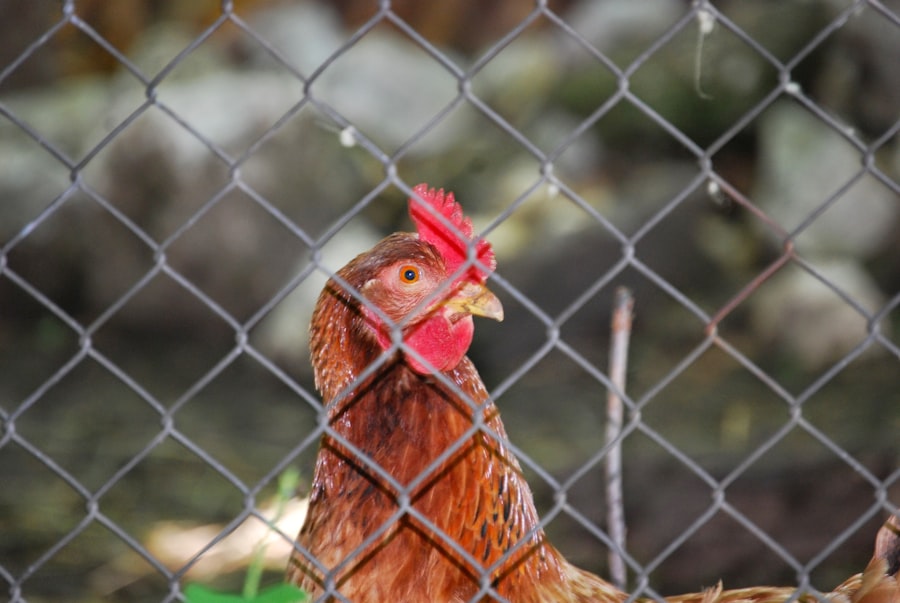
Preventing Stress and Illness
To prevent this, it’s important to ensure that your chickens have enough space within their coop to move around freely and engage in natural behaviors such as scratching and dust bathing.
Keeping Chickens Stimulated and Engaged
Additionally, providing entertainment such as perches, toys, and even mirrors can help keep your chickens stimulated and engaged, reducing their likelihood of becoming stressed or bored.
Ensuring Well-being and Security
By providing adequate space and entertainment for your chickens within their coop, you can help ensure their well-being and reduce their vulnerability to potential predators.
Training Your Chickens
Training your chickens can also play a crucial role in keeping them safe within their coop. By teaching them to come when called or respond to certain cues, you can help ensure that they remain within their designated area and are less likely to wander into areas where they may be at risk from potential predators. Additionally, training your chickens can help them become more comfortable with human interaction, making them easier to handle if you need to perform routine health checks or administer medication.
By taking the time to train your chickens, you can help ensure their safety within their coop while also strengthening your bond with them. Training your chickens can also play a crucial role in keeping them safe within their coop. By teaching them to come when called or respond to certain cues, you can help ensure that they remain within their designated area and are less likely to wander into areas where they may be at risk from potential predators.
Additionally, training your chickens can help them become more comfortable with human interaction, making them easier to handle if you need to perform routine health checks or administer medication. By taking the time to train your chickens, you can help ensure their safety within their coop while also strengthening your bond with them. In conclusion, keeping your chickens safe within their coop requires careful consideration of various factors such as choosing the right type of fence, securing its bottom, regular inspections and maintenance, using additional materials like chicken wire or hardware cloth when necessary, creating barriers against jumping predators, providing adequate space and entertainment for your flock, as well as training them accordingly.
By implementing these measures effectively, you can help ensure that your chickens remain safe and secure within their coop while also promoting their overall well-being.
If you’re looking for a reliable chicken coop to keep your chickens safe and secure, you might want to check out the Producers Pride Sentinel Chicken Coop. This coop is designed to keep your chickens inside the fence and protected from predators. It’s a great investment for any chicken owner looking to provide a safe and comfortable environment for their flock. For more information on this coop, you can read the full review here.
FAQs
What are the benefits of keeping chickens inside a fence?
Keeping chickens inside a fence helps to protect them from predators, prevents them from wandering into neighboring properties, and allows for better control of their feeding and care.
What type of fence is best for keeping chickens inside?
A sturdy fence with small gaps or mesh is best for keeping chickens inside. This can be a wire mesh fence or a wooden fence with small gaps between the boards.
How high should the fence be to keep chickens inside?
The fence should be at least 6 feet high to prevent chickens from flying over it. Some chicken breeds are known for their ability to fly, so a higher fence may be necessary.
What are some additional measures to keep chickens inside the fence?
In addition to a secure fence, it’s important to regularly inspect the fence for any damage or weak spots, and to reinforce the bottom of the fence to prevent digging.
Are there any plants or landscaping that can help keep chickens inside the fence?
Planting dense shrubs or bushes along the perimeter of the fence can help deter chickens from trying to escape, as they prefer to stay in areas with cover and shade.
What are some common challenges in keeping chickens inside a fence?
Common challenges include predators digging under the fence, chickens finding ways to fly over the fence, and the need for regular maintenance and repairs to the fence.
Meet Walter, the feathered-friend fanatic of Florida! Nestled in the sunshine state, Walter struts through life with his feathered companions, clucking his way to happiness. With a coop that’s fancier than a five-star hotel, he’s the Don Juan of the chicken world. When he’s not teaching his hens to do the cha-cha, you’ll find him in a heated debate with his prized rooster, Sir Clucks-a-Lot. Walter’s poultry passion is no yolk; he’s the sunny-side-up guy you never knew you needed in your flock of friends!

